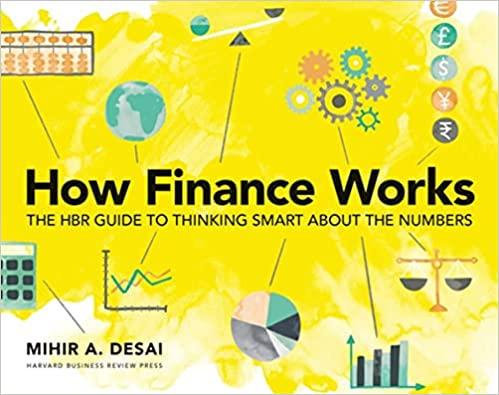Question
You are the VP of Finance for a manufacturing firm. The CFO has asked you to analyze the development of a new factory and report
You are the VP of Finance for a manufacturing firm. The CFO has asked you to analyze the development of
a new factory and report back regarding the financial feasibility of the project. To complete the analysis,
you will prepare a 5-year financial projection, and compute the Net Present Value and IRR for the project.
CAPITAL INVESTMENT
The capital investment (Year 0) for the new factory will consist of:
$15,000,000 for construction of the factory itself, with a depreciable life of 39 years.
$9,000,000 for equipment installed in the factory, with a depreciable life of 15 years.
$5,000,000 for furniture and fixtures in the factory, with a depreciable life of 7 years.
Your companys method of depreciation is straight line.
REVENUES
In Year 1 of production, you estimate you will produce and sell (A)________________ units.
Year 2 production will be 5% greater than Year 1
Year 3 production will be 5% greater than Year 2
Year 4 production will be 2% greater than Year 3
Year 5 production will be 2% greater than Year 4
In Year 1 of production, you estimate your sales price will be (B) ______________ per unit.
The sales price in Years 2 and 3 will be the same as Year 1.
The sales price in Year 4 will be 2% higher than Year 3.
The sales price in Year 5 will be 2% higher than Year 4.
COST OF GOOD SOLD
Your Cost of Goods Sold will be (C)__________________ per unit in Year 1.
Years 2 and 3 will be the same as Year 1.
Year 4 will be 2% greater than Year 3.
Year 5 will be 2% greater than Year 4.
EXPENSES
Payroll Management
: Management payroll will consist of 40 employees. Management payroll for Year
1 is $75,000 per Management employee. Management payroll per employee will increase 3% each year.
Payroll Manufacturing:
Manufacturing payroll will consist of 1 employee for each 1,000 units produced
and sold in a year. Manufacturing payroll for Year 1 is $55,000 per Manufacturing employee.
Manufacturing payroll per employee will increase 3% each year.
Bank Charges Expenses
will be equal to of 1% (.005) of Total Revenues each year.
Employee Training Expense
will be equal to $2,500 per employee. The cost per employee will increase
each year by an estimated inflation amount equal to 3%.
The following expenses are a fixed estimate grown each year by the inflation estimate
EXPENSE NAME
YEAR 1
EXPENSE
ANNUAL
GROWTH
RATE
Insurance
$100,000
3%
Maintenance
$500,000
3%
Office Equipment and Supplies
$250,000
3%
Professional Fees (Legal /
Accounting)
$3,000,000
3%
Real Estate Taxes
$1,200,000
3%
Telephone and Communications
$450,000
3%
Utilities
$1,000,000
3%
Miscellaneous Expense
will be equal to 2% of Total Revenues each year.
INCOME TAXES
Your company income tax rate is 34%
RESIDUAL VALUE / HORIZON VALUE / TERMINAL VALUE
Your assumption for Operating Cash Flows for Year 6+ are that the Cash Flow from Year 5 will continue at a
constant value into the future (aka: a perpetuity)
WEIGHTED AVERAGE COST OF CAPITAL
It is assumed that the project will be capitalized with (D)______% long term debt at a gross rate of 9.00%.
The balance of the capital will be common stock, with a projected cost of 20%.
DELIVERABLES
Using the template provided (or something very similar), prepare a memorandum and supporting materials
that include your recommendation as to whether the project should be completed.
RECOMMENDATION:
In this paragraph you simply state your recommendation. Something like... I have
prepared an analysis of the construction of the new factory. Based on my analysis, I believe we should
pursue (or not pursue) development of the new factory.
ANALYTICAL RESULTS:
My analysis included a Net Present Value analysis and calculation of the Internal
Rate of Return. I have calculated a projected NPV of $____________ and an IRR of ____%. Describe why these
are good or not so good values. This is the basis for your recommendation above.
ATTACHED MATERIALS
Exhibit A: Total Capital Investment and Annual Depreciation Calculation
Exhibit B: 5 Year Projection of Operating Cash Flows (This will be an income statement)
Exhibit C: Summary of Weighted Average Cost of Capital Calculation
Exbibit D: Calculation of Net Present Value and Internal Rate of Return
Step by Step Solution
There are 3 Steps involved in it
Step: 1

Get Instant Access to Expert-Tailored Solutions
See step-by-step solutions with expert insights and AI powered tools for academic success
Step: 2

Step: 3

Ace Your Homework with AI
Get the answers you need in no time with our AI-driven, step-by-step assistance
Get Started


